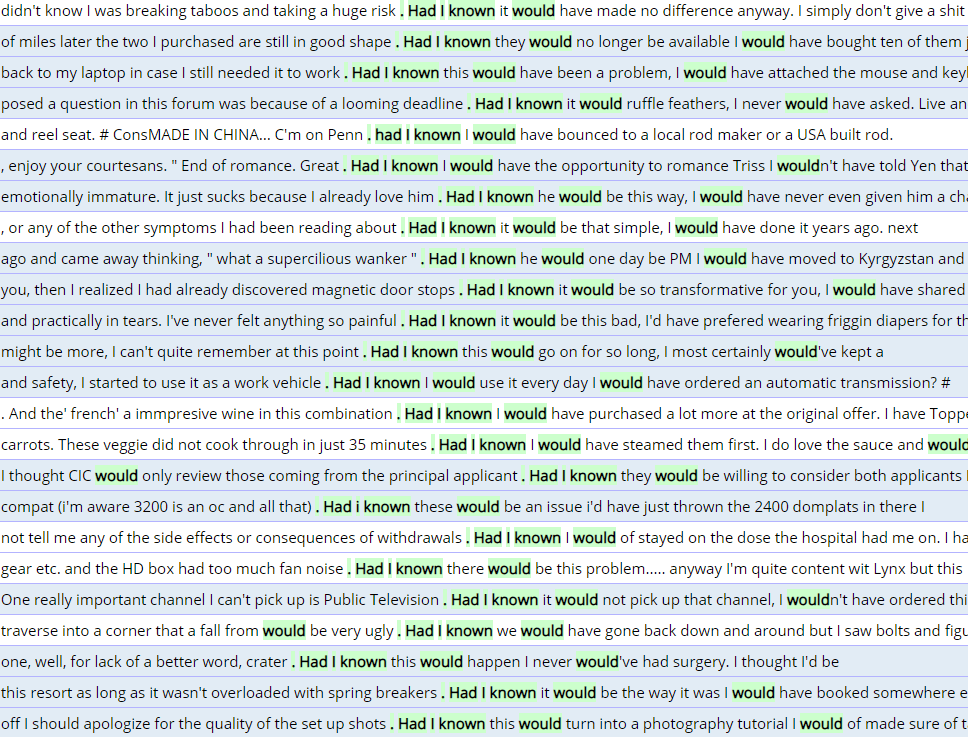Here are examples of subject – auxiliary verb inversion replacing the usual ‘if’:
Had I known what was inside, I would have smoked it.
Should you desire, I can provide character references.
Were I allowed to defend myself, I could have proven this to you.
This is another post that points at overlapping points on the English Grammar Profile. Parts of two points are worded differently but basically locate the same structure for “should” starting a sentence. The only noticeable difference for these points in succession is that one is labelled as conditional and the other located in a “formal context”. The reality is that both sets of examples seem to meet those criteria.
Point 110 also directly clashes with a “higher” level of C2 for the same structure which is more of a problem when using the EGP. Here it is not merely redundant like the differences between 109 and 110, but actually leaves the users wondering what level to give to this “third conditional”. The clearest example of similarity is the “Had we known…” The examples at both levels use past perfect and could be considered to imagine how the past may have been different.
Points 109 & 110 in clauses
INVERTED CONDITIONAL ‘SHOULD‘ C1 ‘should’ + inverted subject.
Should you require any further information about the program or any other detail please do not hesitate to ask for it.
Should there be a lack of mutual understanding a break-up is unavoidable.
INVERSION subordinated C1 inverted ‘should/had/were’ + subject + verb, in formal contexts.
Should you need any further assistance, do not hesitate to contact me.
Had we known that before we could have taken more money with us.
Were I able to travel to any place and time, I would probably choose the Greece of more than two thousand years ago.
Then there is point 134 in clauses:
INVERTED PAST PERFECT, IMAGINED PAST conditional C2 past perfect + inverted subject, and a modal verb + ‘have’ + ‘-ed’ in the main clause to talk about imagined situations in the past.
Had he been more experienced he would have known that these things always happen in this part of the world.
Had we known this fact we would have organised more activities within school hours.
Had we learnt from the mistakes of the past, we would have given up fighting each other a long time ago.
Had I known so many people from abroad were coming to visit our stand, I would have studied harder during my private lessons in the past.
Had this file fallen into enemy hands, it might have had disastrous effects on the Western world.
Had public transportation been an option I would have chosen that instead of my car.
A search on iWeb corpus for:
. Had * _v?n*
results in:
1 . HAD IT BEEN 1368
Never before in the history of humanculture
had it been as professionalized,
never before as concentrated.
The phrase “never before + had it been” is an example of subject-verb inversion. This is a grammatical construction in which the subject of the sentence comes after the verb. In this case, the subject is “it” and the verb is “had been”. The inversion is used to emphasize the negative expression “never before”.
The phrase “never before” means “not at any time before now”. It is used to indicate that something is happening for the first time. In the sentence “Never before had it been so cold in February”, the inversion of the subject and verb emphasizes the fact that the cold weather is unprecedented.
2 . HAD I KNOWN 1172
Sadly, iWeb won’t accept more than 4 spaces to the right for a search. Still, looking at the top 10 collocates 4 spaces to the right of this “Had I known” Ngram, we get:
1 WOULD 338
However, what we would expect to find is the usual “would have + past participle”, but in actual fact what we mostly get is a clause before it without a relative pronoun:
2 THIS 231
3 WHAT 121
4 ABOUT 119
5 THEN 65
6 HOW 64
7 KNOW 58
8 GOING 46
9 BEFORE 36
10 BEFOREHAND 17
3 . HAD I BEEN 1057
4 . HAD HE BEEN 867
5 . HAD THERE BEEN 760
6 . HAD THEY BEEN 540
7 . HAD THIS BEEN 441
8 . HAD SHE BEEN 295
9 . HAD WE BEEN 277
10 . HAD HE DONE 241
11 . HAD THEY DONE 197
12 . HAD I HAD 179
13 . HAD I DONE 170
14 . HAD THAT BEEN 169
15 . HAD YOU BEEN 160
16 . HAD HE LIVED 141
17 . HAD WE KNOWN 135
18 . HAD N’T THOUGHT 125
19 . HAD WE HAD 103
20 . HAD I GONE 101
21 . HAD I SEEN 99
22 . HAD I USED 97
It should be remembered though that these are not necessarily inversion, but could be the start of questions starts. Still, we can get an idea of how frequent the “Had I known” Ngram is.
Inverted subjunctive ‘were’ is very rare or too hard to locate in corpora. The best we can do in iWeb is:
. were I|he|she _VVN
1 . WERE I FORCED 3
- Were I forced to find a place for myself within Christianity today, it would be as a liberal Catholic.
2 . WERE I BORN 3
3 . WERE I ALLOWED 2
4 . WERE HE BORN 2
5 . WERE I DISPOSED 2
6 . WERE I GIVEN 2
7 . WERE I MADE 2
8 . WERE I GRANTED 2
9 . WERE I PERMITTED 2
10 . WERE I PAID 1

